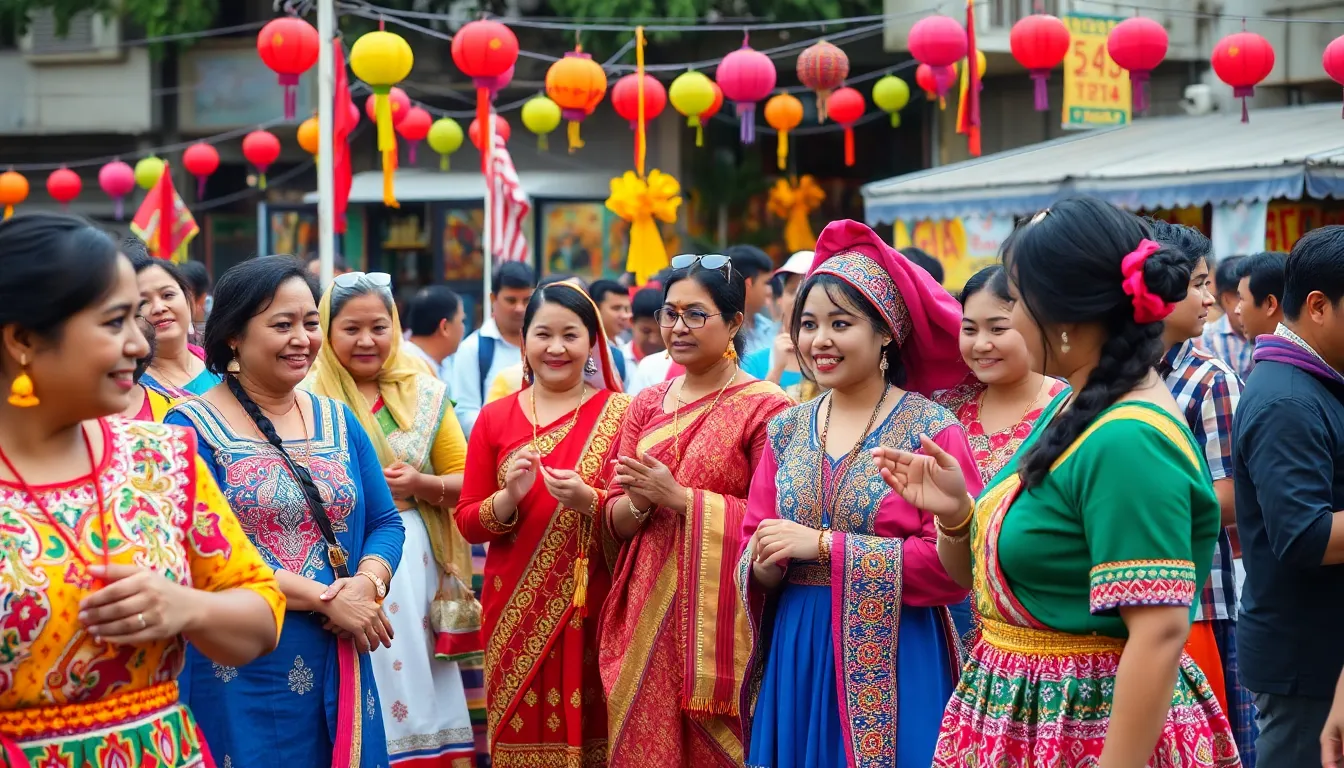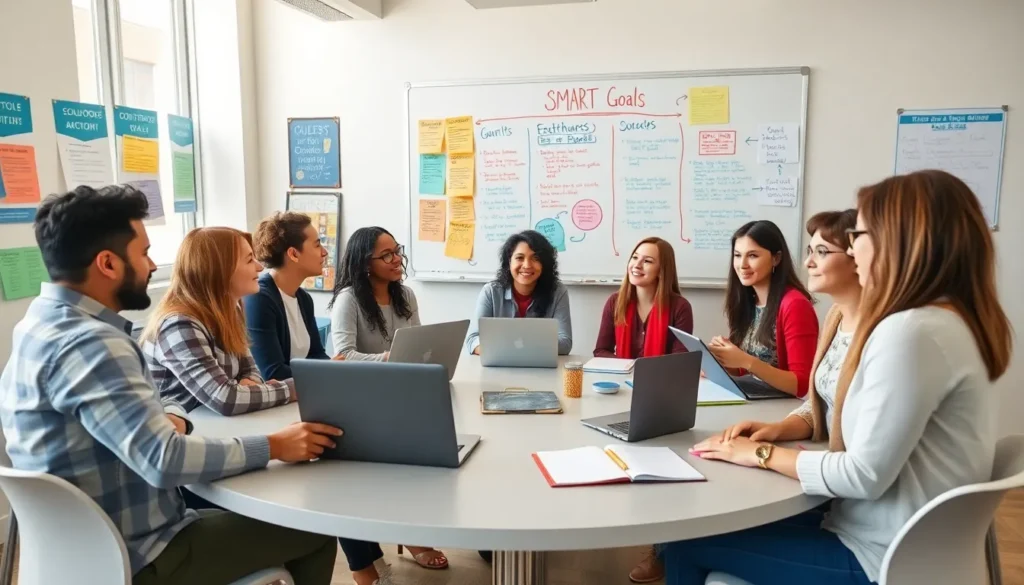Traditions shape cultures and connect communities across the globe. They offer a glimpse into the values, beliefs, and histories that define societies. From vibrant festivals to unique rituals, each tradition tells a story that enriches our understanding of humanity.
Exploring these traditions reveals not just what people do but why they do it. Whether it’s the warmth of family gatherings during holidays or the solemnity of rites of passage, these practices foster a sense of belonging and continuity. As the world becomes more interconnected, appreciating diverse traditions becomes essential in fostering respect and unity among different cultures.
Table of Contents
ToggleOverview of Traditions Explored
Traditions serve as vital expressions of cultural identity, preserving collective memories and practices over generations. They encompass a wide range of activities, from festive celebrations like New Year’s festivals and local carnivals to solemn rites such as funerals and weddings. Each tradition carries unique meanings, reflecting a society’s values and beliefs.
Exploring traditions uncovers the rich tapestry of human experience. By examining various customs, individuals gain insight into the diverse ways communities celebrate life events, honor ancestors, and foster social bonds. Rituals, for instance, can signal passages from one life stage to another, highlighting both individual and collective journeys.
Understanding traditions also illuminates how societies adapt practices in modern contexts. Certain traditions evolve to fit contemporary values while preserving their core essence. This dynamic interplay shows the fluidity of cultural practices, enabling celebrations to remain relevant across generations, fostering unity and continuity in a rapidly changing world.
Cultural Significance

Traditions hold substantial cultural significance as they embody the essence of community identity and preserve heritage. Examining these elements reveals their impact on society and the collective consciousness.
Role in Community Identity
Traditions play a crucial role in shaping community identity. They create a sense of belonging among members, reinforcing shared values and beliefs. Festivals, rituals, and communal gatherings unite individuals around common experiences, fostering social cohesion. For instance, local celebrations often reflect unique cultural narratives, providing a platform for collective expression. The participation in these activities strengthens relationships, establishes social networks, and instills pride in one’s heritage.
Preservation of Heritage
Traditions serve as vital conduits for preserving cultural heritage. They ensure continuity of historical practices, passing down knowledge and customs from one generation to the next. Through storytelling, art, and rituals, communities maintain connections to their ancestors, keeping their legacies alive. For example, culinary traditions reflect regional ingredients and cooking methods, offering insight into a community’s lifestyle and history. Such practices help safeguard cultural identities, allowing them to evolve while retaining core elements that define them.
Common Themes in Traditions
Traditions often share core themes that highlight the interconnectedness of communities. Common themes include family dynamics, rituals, and celebrations that play pivotal roles in maintaining cultural identity.
Family and Kinship
Family and kinship represent central elements in many traditions, reinforcing bonds among generations. Many traditions focus on familial connections and responsibilities, emphasizing the importance of nurturing relationships. These customs often include gatherings such as family reunions, where shared memories strengthen ties. For instance, holiday traditions often involve specific family recipes passed down, symbolizing unity and continuity. Additionally, rites of passage, such as births, coming-of-age ceremonies, and weddings, mark significant transitions within families. Such events create lasting memories, fostering an enduring sense of belonging and shared heritage.
Rituals and Celebrations
Rituals and celebrations form another foundational theme in traditions, allowing communities to express collective values and beliefs. Many cultural practices involve specific rituals designed to commemorate vital life events, such as weddings or funerals. These events often include unique customs, such as exchanging vows or honoring the deceased, and contribute to a community’s identity. Celebrations, like national holidays or religious festivals, unite individuals through shared experiences, enhancing social cohesion. For example, harvest festivals reflect gratitude for agricultural abundance, while religious observances reinforce spiritual beliefs. Through these communal experiences, individuals develop a deeper appreciation for their culture and its shared narratives.
Global Perspectives
Traditions reflect the diverse tapestry of human experience, revealing how cultures express values and beliefs across the globe. Understanding these variations fosters appreciation and connection among different communities.
Traditions from Around the World
Traditions manifest uniquely across different regions, showcasing cultural diversity.
- Asian Festivals: Lunar New Year celebrations involve family reunions, vibrant parades, and feasts, emphasizing good fortune and renewal.
- African Rites: Many African cultures celebrate life milestones through elaborate ceremonies, like initiation rites and weddings, highlighting communal bonds and spiritual connections.
- European Customs: In Europe, traditions, such as Oktoberfest in Germany and La Tomatina in Spain, reflect local history and agricultural practices, reinforcing regional identities.
- Indigenous Practices: Indigenous peoples across the Americas honor ancestral connections and the land through rituals and storytelling, safeguarding cultural histories.
These examples illustrate how traditions serve to enhance community ties, instill pride, and preserve heritage in various cultural contexts.
Comparison of Different Cultures
Cultural comparisons reveal distinct practices and shared themes in traditions worldwide.
- Rituals of Passage: From bar mitzvahs in Jewish culture to quinceañeras in Latin America, these milestones signify an individual’s transition into adulthood, emphasizing family and community support.
- Harvest Celebrations: Thanksgiving in the United States and the Mid-Autumn Festival in China celebrate agricultural abundance, focusing on gratitude and family gatherings.
- Religious Observances: Christmas and Diwali highlight the importance of faith and spirituality, with festivities serving to reinforce communal bonds and collective beliefs.
- Culinary Traditions: Food plays a pivotal role in traditions, with regional dishes reflecting local ingredients and historical influences, further linking communities through shared culinary practices.
These comparisons underscore both the uniqueness and commonality of human experiences, fostering intercultural understanding in a globalized world.
Impact of Modernization
Modernization significantly influences traditions, reshaping practices and beliefs across cultures. As societies evolve, traditional customs undergo changes that reflect contemporary values and lifestyles.
Changes in Traditional Practices
Changes manifest in various traditional practices as communities confront modern realities. For example, wedding ceremonies increasingly integrate technology, such as livestreaming events for distant family members. In many societies, cultural festivals adapt by incorporating modern entertainment, like holographic displays or virtual reality experiences, attracting younger generations. Additionally, culinary traditions evolve as global cuisines blend, leading to fusion dishes that retain historical roots while appealing to new tastes. These adaptations ensure traditions remain relevant and engaging, fostering participation across demographic groups.
Revival Movements
Revival movements emerge in response to the dilution of traditions amidst modernization. Cultural groups actively seek to restore and maintain practices, highlighting their significance in identity and heritage. Events centered on traditional music, dance, and art forms demonstrate this resurgence, often organized by community members dedicated to preserving cultural legacies. For instance, annual celebrations honoring Indigenous practices in North America promote awareness and appreciation while fostering intergenerational participation. Furthermore, social media platforms have become vital for sharing and reviving lost or endangered traditions, allowing communities to connect globally and reinvigorate local customs.
Traditions play a crucial role in shaping cultural identities and fostering community bonds. They serve as living expressions of shared values and beliefs that connect individuals across generations. By appreciating the diverse practices and meanings behind these customs, people can cultivate respect and understanding among different cultures.
As traditions evolve in response to modern influences, their core essence often remains intact, allowing them to resonate with new generations. This adaptability ensures that traditions continue to enrich lives, strengthen connections, and preserve heritage. Ultimately, recognizing the importance of traditions can help create a more unified and harmonious world.









